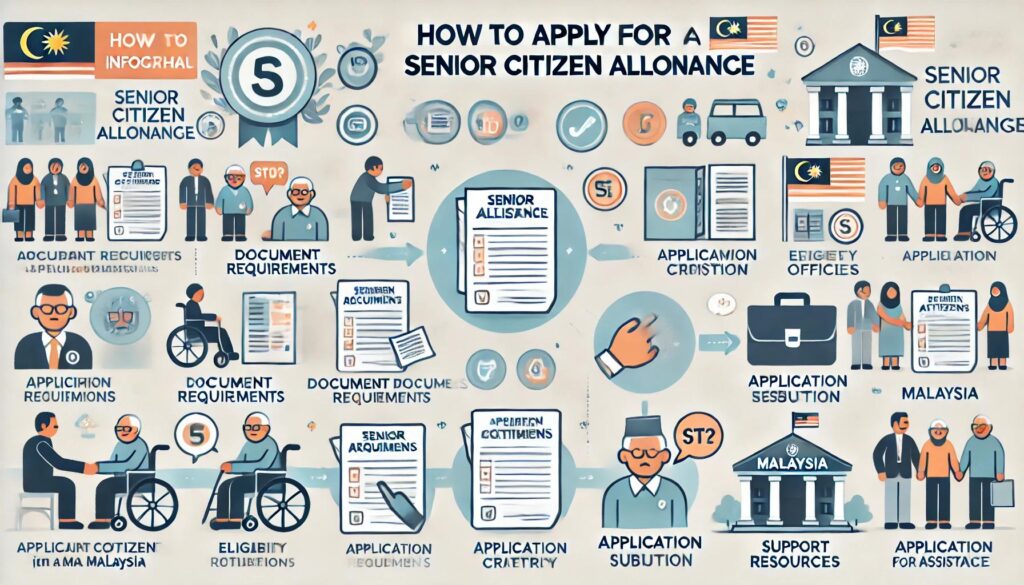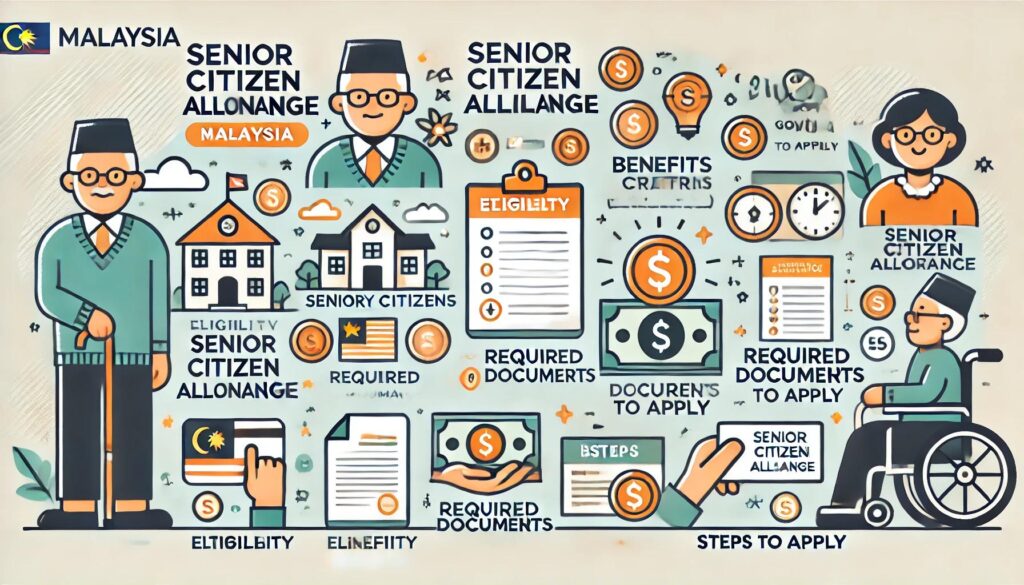How to Apply for Senior Citizen Allowance in Malaysia
The Senior Citizen Allowance in Malaysia represents a crucial aspect of the country’s social welfare system, aimed at providing financial support to elderly individuals, ensuring they live with dignity and security. As Malaysia continues to evolve into an aging society, with a significant portion of the population over 60 years old, the government has recognized the need to bolster support mechanisms for these individuals.
Eligibility Criteria
In Malaysia, a senior citizen is defined as someone aged 60 and above. The eligibility for the Senior Citizen Allowance is typically based on financial need, ensuring that the aid reaches those who are most vulnerable and have limited means of support. Applicants need to provide substantive evidence of their financial status, including income thresholds that may vary depending on regional policies and specific living conditions. This ensures that the allowance assists those with the greatest need, prioritizing low-income households and individuals who may not have substantial retirement savings.
Application Process

The process to apply for the allowance has been designed to be user-friendly, catering to the diverse needs of senior citizens who may or may not be technologically adept.
1. Documentation Requirements:
Applicants need to prepare essential documents, such as their MyKad, proof of residency, and documents proving financial status. These documents allow the authorities to verify the applicant’s eligibility accurately, ensuring the system is fair and efficient.
2. Online Application:
The introduction of the eBantuanJKM portal has revolutionized the application process by providing an online platform where applicants can submit their details and documents. This digital approach not only expedites the process but also makes it more accessible, especially for those who may find travel challenging.
3. In-Person Applications:
Despite technological advancements, the Malaysian government understands that not all seniors are comfortable with digital platforms. As a result, applications can also be submitted in-person at District Social Welfare Offices. This option provides personalized assistance from staff, ensuring that applicants who might struggle with the online system receive the necessary support to complete their applications.
Benefits Beyond the Allowance

Senior citizens in Malaysia enjoy a range of benefits that extend beyond the financial allowance, aiming to improve their overall quality of life.
- Healthcare Benefits: Seniors benefit from subsidized healthcare services at public hospitals and clinics. This includes discounts on medication and reduced fees for medical check-ups, which are crucial for managing age-related health issues.
- Transportation Discounts: Public transportation services offer senior citizens significant discounts, sometimes providing free services during off-peak hours. This benefit encourages mobility and independence, allowing seniors to remain active in their communities.
- Tax Relief: Older individuals qualify for tax exemptions and reductions, which alleviate financial burdens and help stretch their fixed incomes further. These tax incentives are particularly beneficial for seniors who continue to work or have investments generating income.
- Legal Protection and Support: Malaysian law provides a framework to protect the rights of senior citizens, including aspects related to inheritance and property. This legal protection ensures that seniors’ interests are safeguarded, providing peace of mind for them and their families.
Government Initiatives and Future Plans
The Malaysian government, recognizing the demographic shift towards an aging population, has prioritized measures to enhance social welfare provisions for the elderly. The Budget 2025 initiatives are a testament to this commitment, with increased allocations aimed at expanding the financial and social support structures for senior citizens.
These initiatives include:
- Increased Allowance: The allowance for senior citizens has been raised as part of the national budget enhancements. This increase acknowledges the rising cost of living and the need for greater financial support to ensure seniors can meet their daily expenses comfortably.
- Comprehensive Social Protection Plans: The government is exploring broader social protection schemes to cover a range of needs from healthcare to housing, ensuring that services are integrated and more efficiently delivered. This includes innovative solutions tailored specifically for seniors and vulnerable groups.
- Enhancing Retirement Savings: Recognizing gaps in retirement savings, the government is working towards bridging these through programs like the Employees Provident Fund (EPF). Initiatives under EPF aim to increase savings and provide better financial security post-retirement.
- Social and Educational Programs: Programs aimed at lifelong learning and social inclusion are being promoted, encouraging seniors to engage in community activities and continue their education. These initiatives not only improve mental health but also empower seniors to remain active contributors to society.
Conclusion
The Senior Citizen Allowance and associated benefits represent a vital component of Malaysia’s strategy to support its aging population. By providing comprehensive financial, healthcare, and social benefits, the Malaysian government aims to enhance the quality of life for senior citizens and ensure they are valued members of society. The proactive measures, particularly those outlined in the recent budget, underscore a commitment to adapting to demographic changes and meeting the evolving needs of older Malaysians.
As Malaysia moves forward, the focus remains on creating a sustainable and inclusive environment that not only supports but celebrates its senior citizens, paving the way for a society where aging is viewed as an opportunity for continued contribution rather than a challenge.

Pertubuhan Rumah Kebajikan Seri Cahaya Pulau Pinang (Seri Cahaya) opens its door in 1999 to salve the needs of the needy.
We are registered charity home with RoS and LHDN.
- RoS. PPM-009-07-31072003
- LHDN. 01/35/42/51/179-6.6116
- Donate the amount you like
- Enjoy Income Tax Relief
DONATE
ADDRESS
741 Lintang Permatang Damar Laut, Kampung Batu Maung,
11960 Bayan Lepas, Pulau Pinang
© Copyright Pertubuhan Rumah Kebajikan Seri Cahaya Pulau Pinang 2024


Leave a Reply